HIPAA compliance audits are a critical aspect of healthcare data protection, but they can be costly and complex. At ScriberJoy, we understand the challenges organizations face when preparing for these audits.
This blog post will break down the factors influencing HIPAA compliance audit costs and provide insights into budgeting for this essential process. We’ll explore strategies to minimize expenses while maintaining thorough compliance, helping you navigate the financial aspects of HIPAA audits effectively.
What Are HIPAA Compliance Audits?
HIPAA compliance audits evaluate healthcare organizations’ adherence to the Health Insurance Portability and Accountability Act (HIPAA) regulations. These audits protect patient privacy and secure protected health information (PHI).
OCR Audits vs. Internal Audits
The Office for Civil Rights (OCR) conducts official HIPAA audits, which complaints, data breaches, or random selection can trigger. These audits are thorough and can result in significant penalties for non-compliance. As of November 21, 2024, OCR has settled or imposed civil money penalties in 152 cases, resulting in a total of $144,878,972.00.
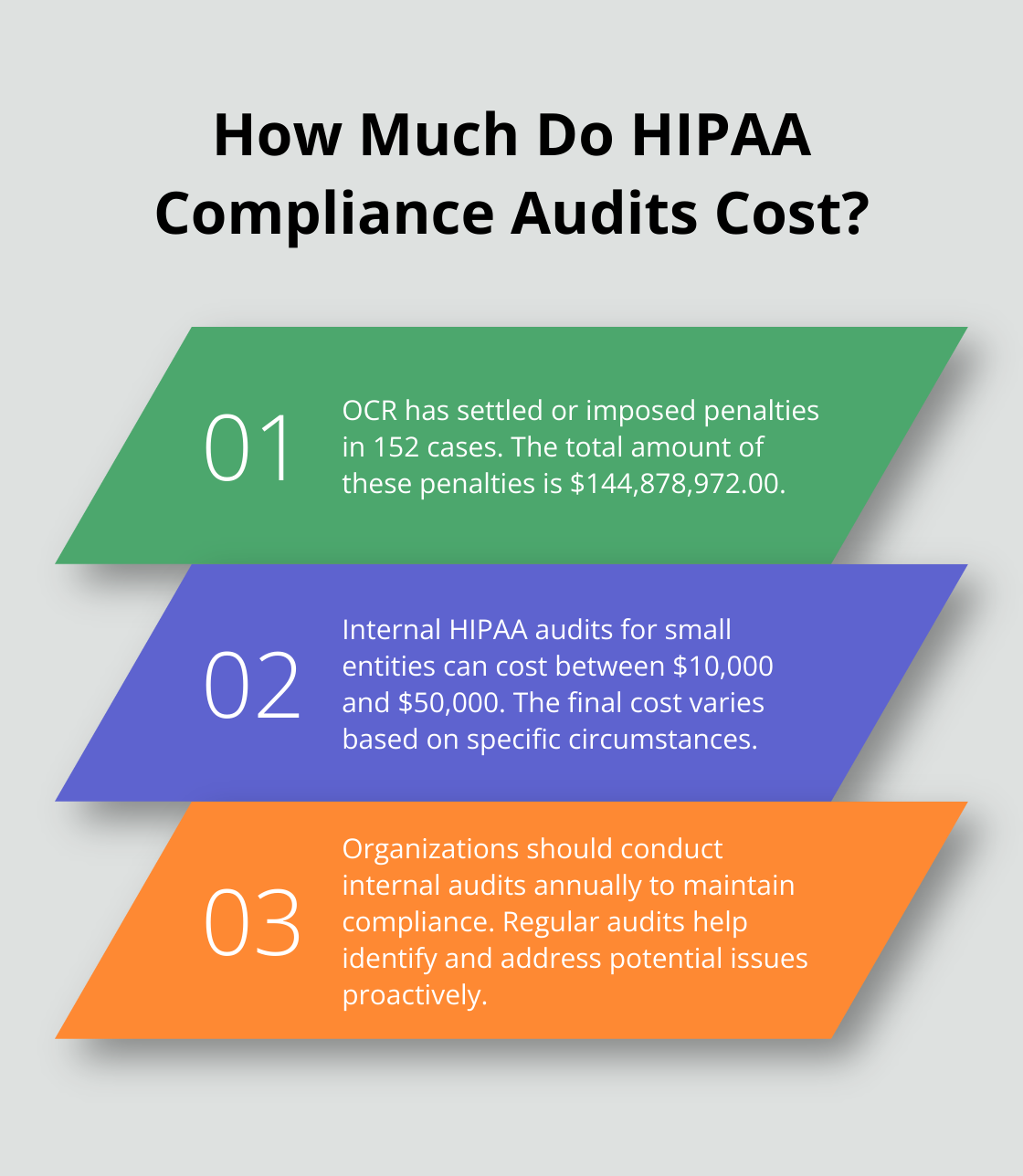
Internal audits are proactive measures organizations take to assess their own compliance. These self-assessments help identify and address potential issues before an OCR audit occurs. An internal HIPAA audit conducted by an external auditor can cost between $10,000 and $50,000 for small entities with 50 or fewer employees, with the final cost varying based on specific circumstances.
Frequency and Scope of HIPAA Audits
OCR audits occur at varying intervals, as they can be random or triggered by specific events. Organizations should conduct internal audits regularly (ideally annually) to maintain compliance.
The scope of HIPAA audits ranges from comprehensive evaluations of all HIPAA rules to targeted assessments focusing on specific areas like security or privacy. A full audit examines an organization’s policies, procedures, employee training, risk assessments, and technical safeguards.
Preparing for HIPAA Audits
To prepare for audits, organizations should take the following steps:
- Appoint a dedicated HIPAA security and privacy officer to oversee compliance efforts.
- Conduct regular risk assessments to identify vulnerabilities in PHI handling.
- Implement comprehensive employee training programs on HIPAA regulations.
- Develop and maintain up-to-date policies and procedures related to HIPAA compliance.
- Establish a robust incident management plan to address potential security breaches.
The Role of Technology in HIPAA Audits
Technology plays a significant role in HIPAA compliance and audits. Organizations must implement appropriate technical safeguards (such as encryption and access controls) to protect PHI. During audits, assessors will evaluate the effectiveness of these technological measures.
Advanced software solutions can streamline the audit process by automating documentation, tracking compliance efforts, and generating reports. These tools can significantly reduce the time and resources required for audit preparation and execution.
As we move forward, it’s important to understand the various factors that influence the costs associated with HIPAA compliance audits. These factors can have a substantial impact on an organization’s budget and overall compliance strategy.
What Drives HIPAA Compliance Audit Costs?
HIPAA compliance audit costs vary dramatically depending on several key factors. Healthcare organizations must understand these drivers to budget effectively and prepare for audits.
Organization Size and Complexity
The size and complexity of an organization significantly impact audit costs. Larger healthcare providers with multiple locations and diverse services face higher expenses due to the increased volume of data and systems to review. A small medical practice might spend $10,000 to $30,000 on an audit, while a large hospital system could easily exceed $100,000.
Current Compliance Status
Organizations with robust HIPAA compliance programs in place typically incur lower audit costs. Those starting from scratch or with significant gaps in their compliance efforts face steeper expenses. Mid-range estimates of HIPAA compliance costs fall into the range of between $80,000 and $120,000.
Audit Scope
Comprehensive audits examining all aspects of HIPAA compliance cost more than targeted reviews focusing on specific areas. A full-scale audit can cost 2-3 times more than a targeted one. Healthcare providers should work with auditors to define a scope that balances thoroughness with budget constraints.
Internal vs. External Resources
Relying solely on internal resources can reduce immediate out-of-pocket costs but may lead to oversights and inefficiencies. External consultants, while more expensive upfront, bring specialized expertise that can streamline the audit process and potentially save money in the long run.
Technology Infrastructure
Organizations with modern, HIPAA-compliant technology infrastructure often face lower audit costs. Outdated systems may require significant upgrades to meet compliance standards, adding to overall expenses. Healthcare data breach costs fell by 10.6% year-over-year from $10.93 million in 2023 to $9.77 million in 2024.
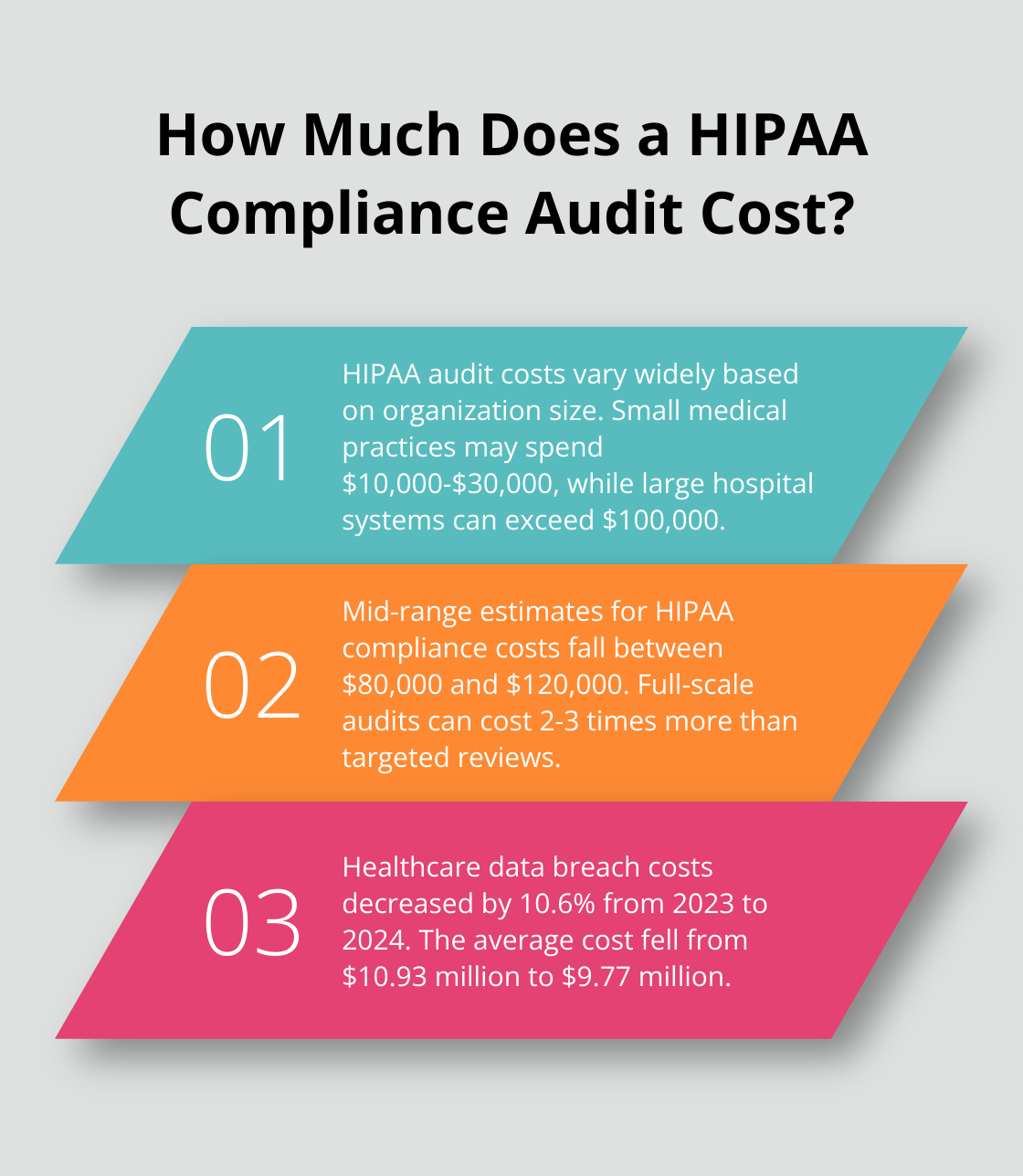
Understanding these cost drivers allows healthcare organizations to better anticipate and plan for HIPAA compliance audit expenses. The next section will provide a detailed breakdown of specific costs associated with these audits, helping you create a comprehensive budget for your compliance efforts.
What Does a HIPAA Compliance Audit Cost?
HIPAA compliance audits involve several key expenses that healthcare organizations must consider. Understanding these costs helps in budgeting effectively and ensures comprehensive compliance.
Risk Assessment and Gap Analysis
A thorough risk assessment and gap analysis form the foundation of HIPAA compliance. This process typically costs between $5,000 and $40,000 (depending on the organization’s size and complexity). Smaller practices might pay around $5,000, while larger healthcare systems could spend upwards of $40,000 for a comprehensive analysis.
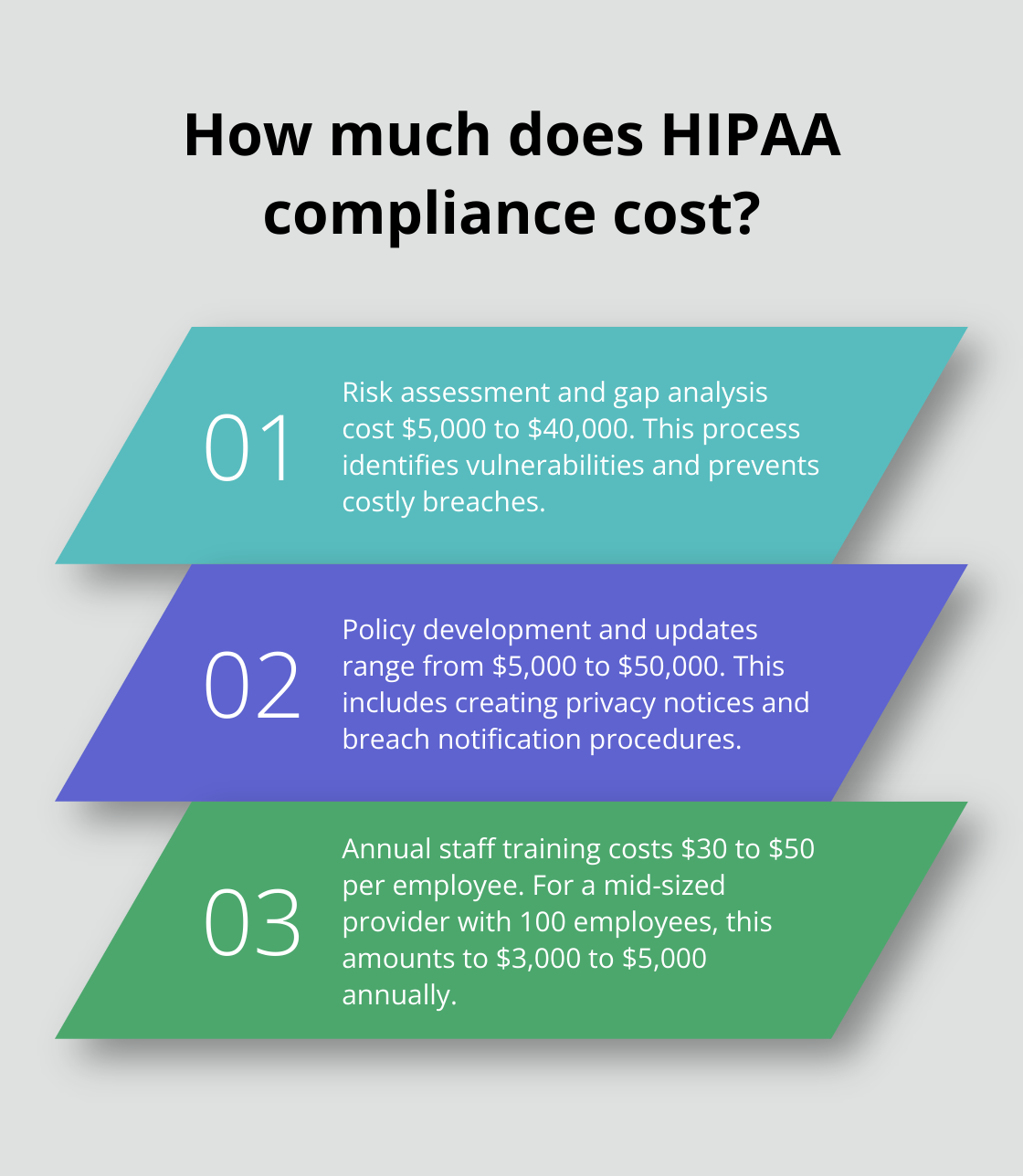
These assessments identify vulnerabilities in your current practices and highlight areas that need improvement. They prevent costly breaches – healthcare data breaches cost an average of $9.77 million in 2024, according to IBM’s Cost of a Data Breach Report.
Policy Development and Updates
Creating or updating HIPAA-compliant policies and procedures is another significant expense. Costs can range from $5,000 to $50,000, depending on the extent of work required. This includes developing privacy notices, breach notification procedures, and business associate agreements.
Many organizations underestimate the time and expertise needed for this task. It’s not just about writing policies; it’s about ensuring they’re practical, enforceable, and align with your specific operations.
Staff Training and Education
Effective staff training maintains HIPAA compliance. Annual training costs typically range from $30 to $50 per employee. For a mid-sized healthcare provider with 100 employees, this translates to $3,000 to $5,000 annually.
However, the real cost often exceeds these figures when you factor in lost productivity during training sessions. Some organizations opt for online training platforms to reduce these indirect costs and provide more flexible learning options.
Technology and Security Upgrades
Technology plays a pivotal role in HIPAA compliance. Necessary upgrades can include encryption software, firewalls, and secure email systems. Costs vary widely based on your current infrastructure, but budget at least $20,000 to $50,000 for initial upgrades.
Ongoing maintenance and updates add to this figure. Cloud-based solutions are gaining popularity due to their scalability and built-in security features, potentially reducing long-term costs.
Documentation and Reporting
Proper documentation proves compliance during audits. This includes maintaining records of risk assessments, policy updates, training sessions, and incident reports. While the direct costs might seem minimal, the time investment is substantial.
Many organizations underestimate the resources needed for thorough documentation. Automated compliance management tools can help streamline this process, with prices ranging from $200 to $800 per month for comprehensive solutions.
HIPAA compliance audits are a significant investment, but the cost of non-compliance is far greater. The Office for Civil Rights has imposed penalties totaling over $144 million as of November 2024. Understanding and budgeting for these expenses allows healthcare organizations to maintain compliance effectively and avoid costly penalties.
Final Thoughts
HIPAA compliance audits require significant investment from healthcare organizations. The costs associated with these audits can be substantial, but they are far less than the potential penalties and reputational damage of non-compliance. Organizations that prioritize compliance often find themselves better positioned to adapt to evolving healthcare regulations and technological advancements.
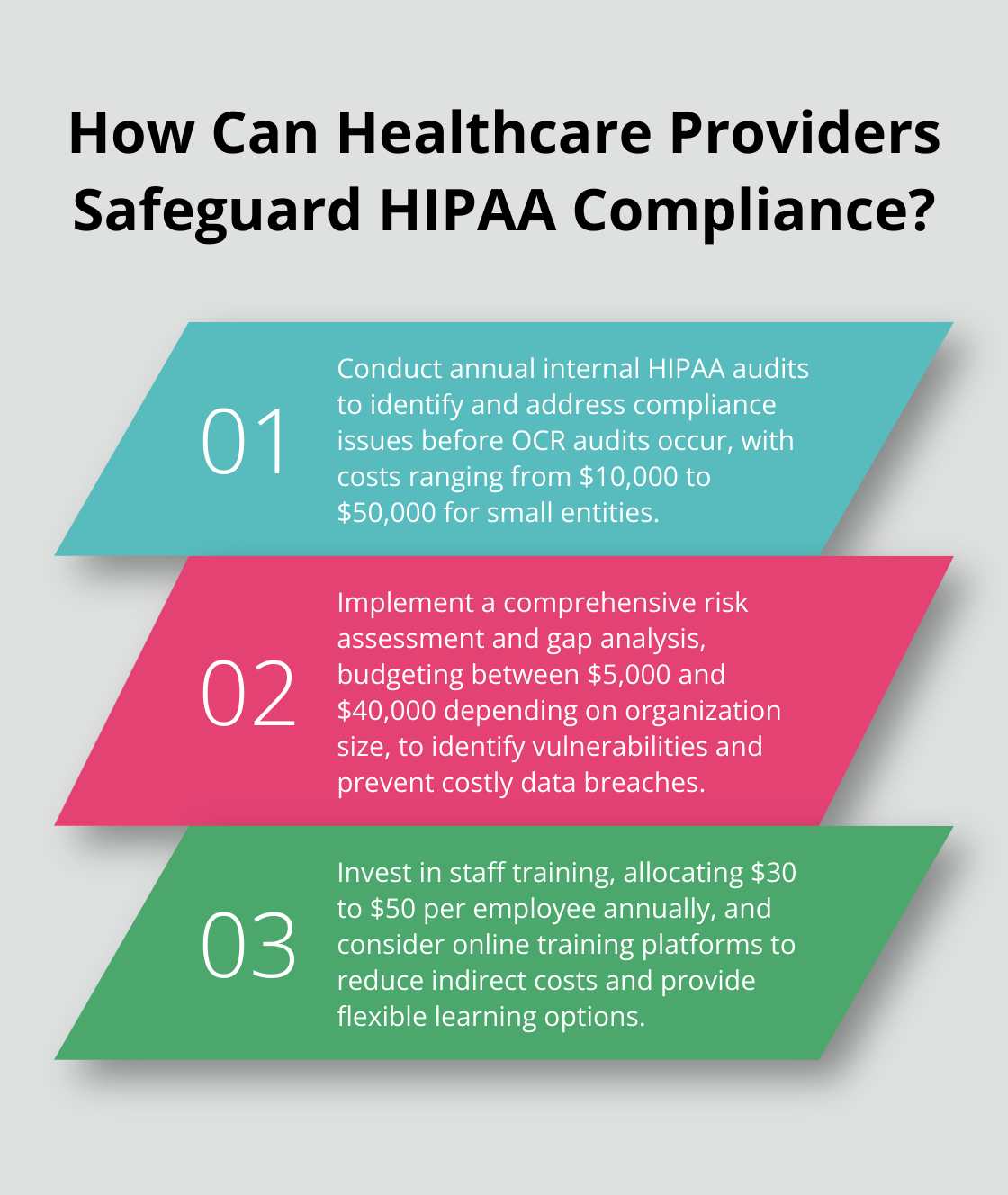
Regular self-assessments help identify and address issues before they become costly problems. Staff training and fostering a culture of compliance reduce the need for extensive remediation during audits. Leveraging technology solutions streamlines compliance processes and reduces manual workload.
ScribeJoy offers AI-powered medical transcription software that improves documentation accuracy and ensures HIPAA compliance. Healthcare providers can significantly reduce the time and resources spent on compliance-related tasks (including HIPAA compliance audit costs) by integrating such solutions. The long-term benefits of robust HIPAA compliance far outweigh the initial expenses.
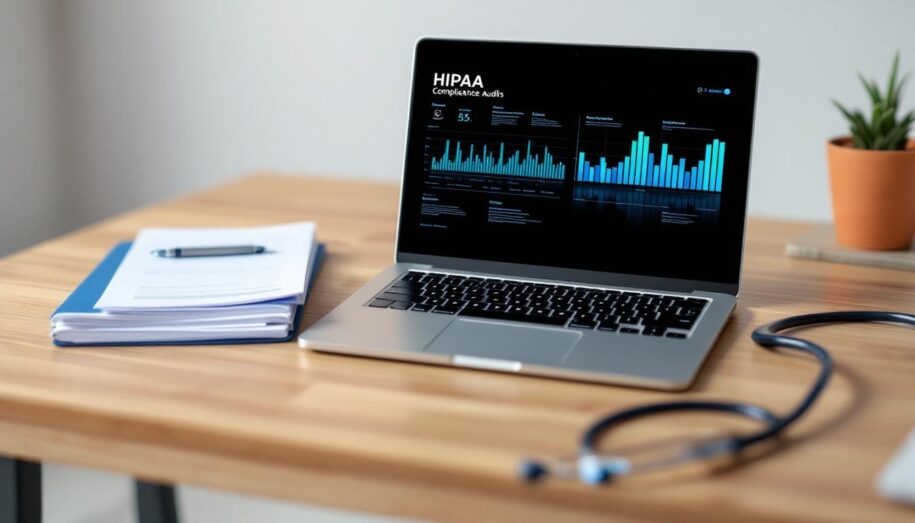
Leave a Reply
You must be logged in to post a comment.